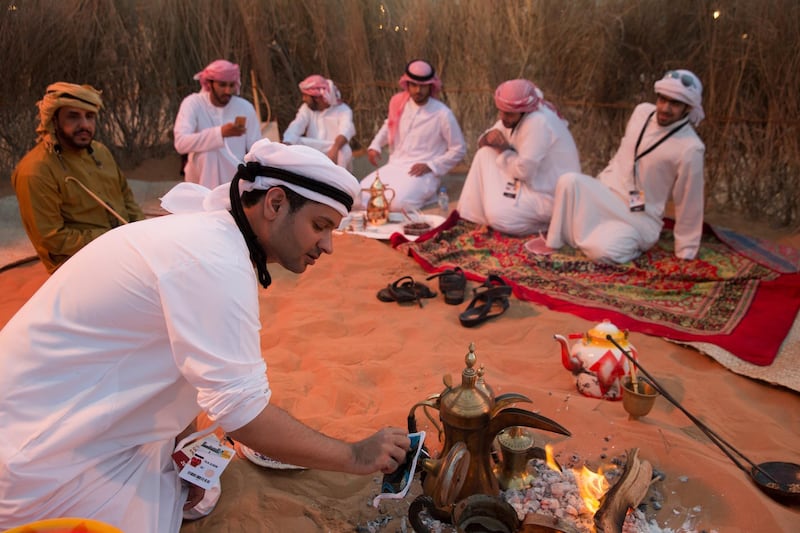Imagine, if you will, that you're hot and tired.
You're at home, doing some mundane task, perhaps watering the plants, responding to emails or searching for misplaced library books. All of a sudden, you hear a clang! clang! – the sound of metal ringing out against metal – and a low shuffling noise. Then a silence – permeated by some welcome smells – and a cheery jingle-jangle of a stack of ceramic cups, rattling against one another.
In traditional Arabic communities, you’ll know it’s the nicest sound in the world. It means only one thing: coffee is served.
In 2015, the UAE inscribed traditional coffee, or gahwa, as served in the Gulf, on to Unesco's intangible cultural heritage list.
A symbol of Arabic hospitality, the hot beverage is made with coffee beans and rosewater, saffron, nutmeg and cloves, in different strengths and in slightly different proportions, and is prepared in front of guests, with the most-honoured visitors being served first. "Gahwa has been a part of our traditions since day one," says Saif Ghobash, undersecretary of Abu Dhabi's Culture and Tourism Department, DCT.
"It is always served in majlises, whether it was a majlis in a cluster of tents back in the day, or in houses today, and the staple of the majlis is gahwa."
Gahwa's place on the intangible heritage list means it sits next to other practices that have been designated as both culturally unique and important to the fabric of society, such as yoga in India, traditional camel coaxing in Mongolia and shrimp-fishing on horseback in Belgium (I highly recommend perusing the list while waiting for your coffee to brew).
As with all of the rituals on the list, the importance isn't merely the drink itself, but the careful steps behind making it. DCT has now turned this ritual of presentation into a project called Bait Al Gahwa, allowing Emiratis to train and become licensed gahwa makers and serve the flavourful beverage to locals and cultural visitors.
"What you don't see as a guest are the steps taken to give you the perfect cup of gahwa," says Ghobash.
Emiratis who have trained to be gahwa makers will narrate and serve the brew in their own Bait Al Gahwa, or coffee house, offering a cultural experience similar to Japanese tea ceremonies, a popular tourist attraction. To make the coffee, one carefully picks over the beans, roasts them and pours them on to a rush mat to cool.
Then, one grinds them into a fine powder with a mortar and pestle (clang! clang!) and adds them to a dallah, one of the three traditional pots used in the preparation of gahwa.
Water is added to the dallah, as well as the spices, depending on house preference. The concoction is strained through rush leaves into the serving dallah, into which saffron leaves have been placed to give the coffee its golden colour and taste. The gahwa maker stands and jingles the stack of cups against each other. Come one, come all!
The Bait Al Gahwa concept is also economically inclined, contributing to the expanding cultural tourism landscape of Abu Dhabi as well as a drive to widen the field of local employment.
“We want not only to preserve culture but to give it what it needs to interact with the tourism sector,” says Ghobash.
“We’ve reserved it for Emiratis only, in our aim to create job and business opportunities.”
The first Bait Al Gahwa will be housed in the visitors' centre of Qasr Al Hosn, slated to open near the Corniche on Abu Dhabi Island later this year, and hopefully a cacophony of clanging pots and jingling cups will follow.
_________________________
Read more:
Wake up and smell the karak: the UAE's obsession with the beautiful cup
Graduating from Starbucks: The third wave of Emirati coffee culture
Follow these seven steps to master the Khaleeji art of 'rounding'






